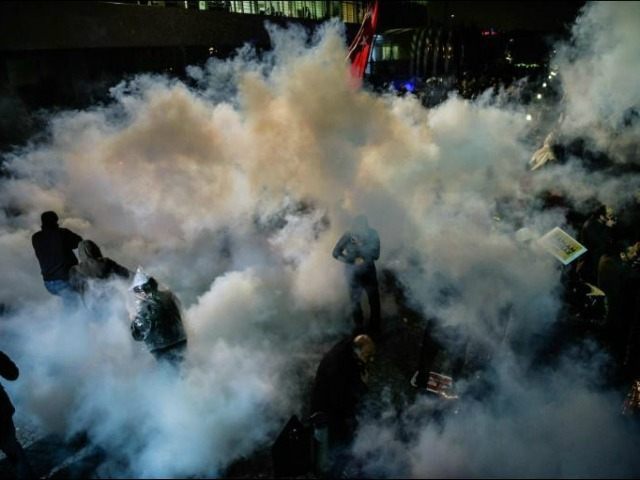After a violent government takeover on Friday, Turkish newspaper Zaman has published its first print edition: an ode to Islamist President Recep Tayyip Erdogan’s infrastructure projects and the Turkish soldiers fighting Kurds in the nation’s south.
Zaman journalists are protesting that they had no input in Sunday’s new print edition and that government-appointed trustees froze them out of decision-making. Zaman, one of Turkey’s largest newspapers, had developed a reputation for also being among the most critical of the president.
In the latest edition of the newspaper, however, there is little pushback on the Erdogan presidency. Instead, the cover story alleges “historic excitement” over Erdogan’s plans for a new bridge across the Bosporus, one he may eventually name after himself upon the completion of construction.
Australia’s ABC notes the cover also “contained images of the funerals of ‘martyrs’ killed in the military clashes with Kurdish rebels in the south-east,” which some suggest is a sign of support for attacks against the Kurdistan Workers’ Party (PKK) terror group. The newspaper also uses a favorable photo of Erdogan attending a pro-woman’s event, holding hands with an elderly woman.
The Turkish government’s takeover of Zaman on Friday turned violent rapidly, as police fired tear gas and water cannons on protesters holding up editions of the newspaper.
The takeover is a result of a Turkish court ordering that a court-appointed board of trustees run the Feza Media Group, which owns Zaman. Erdogan’s government has accused the writers at Zaman of having ties to the cleric Gulen, formerly a Justice and Development Party (AKP) ally now considered a terrorist by Erdogan’s government. Turkey announced an in-absentia trial against Gulen in October for “terrorism” charges, as Gulen is currently exiled in the United States. He has also faced legal troubles in America, accused of running a corrupt charter school system feeding into an Islamist cult. The FBI raided a number of Gulenist charter schools in 2014.
Zaman has a circulation of 650,000, according to Vice, largely the product of providing an alternative view of current affairs from pro-government publications. Journalists at Zaman were warned that the newspaper would experience a “change in editorial policy” after its editor-in-chief was forced out of his job, but were assured the newspaper would remain “unbiased and objective, neutral.” Doubting this, they released a statement on Friday calling the takeover “the darkest and gloomiest days in terms of freedom of the press, which is a major benchmark for democracy and the rule of law.”
“As all of you know we are being governed by a regime that has no respect for our constitution, rule of law, or democracy,” English-language Today’s Zaman editor-in-chief Sevgi Akarcesme remarked. Today’s Zaman’s Twitter account has been deleted, and it does not appear to have published any new material since the takeover. Its articles on the seizure itself remain, however, providing a straightforward interpretation of events and promoting a petition against the takeover.
Mustafa Edib Yılmaz, a journalist who returned to work on Sunday, describes his office as being run under close police surveillance. He tells France24 the protesters have returned with him, too. “Outside of my office window, I can see at least 500 and 600 people, chanting and singing slogans. … I can see conservative women in headscarves out there protesting with five or six-year-old children.” He laments that he does not believe the international community will protest the takeover. “There have been some statements from the European commission, saying something along the lines of ‘we note with high concern,’ which is like the dictionary definition of ‘we are not going to do anything.'”
The government has previously attempted to change leadership within Zaman. In November, the Turkish government issued an arrest warrant against Ekrem Dumanlı, who had stepped down from his position as the newspaper’s editor-in-chief a month prior. Dumanlı had cited “unlawful pressure on press and my personality” from the government as part of his reasoning for stepping down. He was wanted for “attempting a coup” for having alleged ties to Gulen, according to the charges.

COMMENTS
Please let us know if you're having issues with commenting.